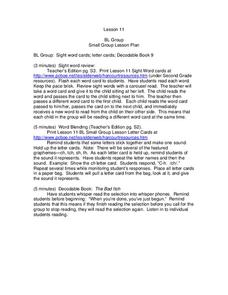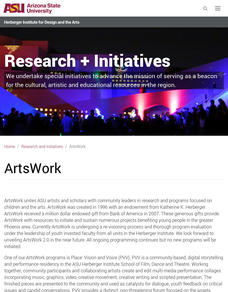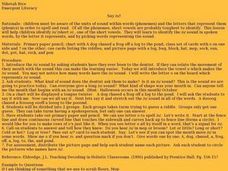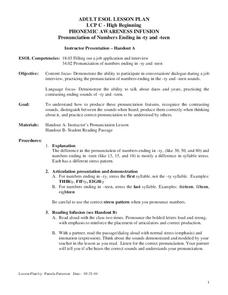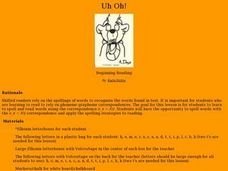Curated OER
Equivalent Expressions A.10
In this equivalent expressions worksheet, 9th graders solve and complete 9 different multiple choice problems. First, they determine the expression that is equivalent to the given equation. Then, students write the diameter of a number...
Curated OER
Prime Factorization: Finding Factors in the Fifth Grade
The lesson plan starts out with a brain drain, which is a great way to get students to activate prior knowledge and build lasting connections. They tell everything they know about prime factorization, use their knowledge to...
College Board
2011 AP® Computer Science A Free-Response Questions
Was computer science any different back then? Scholars peruse the free-response questions from the 2011 AP Computer Science A. By practicing questions related to representing digital sounds as an array of integer values and writing...
Curated OER
Reading Bugs
Review the phonemic sounds of the alphabet letters before examining how to blend letter sounds to make a word. During this teacher-modeled lesson, learners make word bugs out of three phonemes that blend together. As an assessment, read...
Curated OER
Icky Fingers
Which i sound is used in the word icky? Kindergarteners and first graders listen to the short /i/ sound. They practice shaking their fingers to indicate icky when they hear the target sound. Then they practice reading a poster with the...
Curated OER
Lesson 11 BL Group
Three different groups work simultaneously in this lesson. One group works on sight word review by holding up common words on flashcards and passing them around in a circle. Another group reviews word blending by pulling graphemes out of...
Curated OER
Water
Third graders study different bodies of water and how they fit into the water cycle. They explain that materials exist in different states (solid, liquid and gas) and change from one to another, that there are systems, order, and...
Curated OER
Henry Howls
Let's learn the letter h! Elementary learners will hear the sound, learn a catchy tongue twister, and identify the sound in different words the teacher says. After some writing practice, read A House for Hermit Crab, by Eric Carle,...
Curated OER
Say /o/
Ollie the octopus is occupied! Use this tongue twister to help youngsters learn the /o/ sound. After practicing the target sound, learners should print the letter. When they are familiar with the letter and its sound, the group will...
Curated OER
Ehhhh?
Are your kindergarten learners working with the letter e and the sounds that is makes? They'll practice writing a capital e, hear the /e/ sound in a funny tongue twister, and then identify when the teacher is saying a word that uses...
Alabama Learning Exchange
Phonics lesson for -ick family
Kindergarteners and first graders develop phonemic awareness for words that contain -ick. Each learner gets a stack of cards with different -ick words, highlighting the target sound as they review each one.
Curated OER
Aches and Pains
Being able to distinguish between short and long vowel /a/ sounds is an important skill for young readers. They are introduced to the vowel-consonant-e pattern that changes short vowel sounds into long vowel sounds. They practice reading...
Curated OER
Are You My Mother Game
Invite your kindergarteners to explore sound and hearing. Using film canisters, or containers, filled with items from the story "Are You My Mother?" they will predict what the objects were from the story. Tip: you could create a...
Curated OER
PHONEMIC AWARENESS INFUSION
Students demonstrate the ability to participate in conversation/ dialog during a job interview. They demonstrate how to produce these pronunciation features, recognize the contrasting sounds, distinguish between the sounds when heard,...
Curated OER
Cheese Please
Do you like cheese? What sound does the word start with? Learn all about the /ch/ sound and what other words make the same sound.
Curated OER
Icky Sticky Fingers
Practice recognizing the short vowel /i/ in written and spoken language. Introduce the target sound with a fun tongue twister about Lizzy the lizard. Through matching and listening activities, learners discriminate the vowel sound /i/...
Curated OER
The Creaky Door Says "ehhhh"
Study the long vowel sound /e/, as in a creaky door noise. Children repeat the sound and learn a chant. They use letters in letterboxes to make words with the /e/ sound before reading a book and writing a message about their favorite...
Curated OER
All Ears for Adaptation
Students discuss different characteristics that enable animals to adapt to their environments. They work in pairs with one partner standing about one foot behind the other partner and cup their hands around their ears with palms forward....
Curated OER
Alphabet Sideshow
Learners practice sound and recognition of letters in alphabetical sequence. They gain an understanding of letter sounds and order. They create a slide show with graphics and text. They present their slide show to the class.
Curated OER
Derbyshire Accent Project 1
Compare the Derbyshire accent to Standard English. There are eight common differences between the two languages for learners to discover. A great worksheet to start a discussion on the various forms and conventions of Standard English.
Curated OER
Commonly Misused Words
Affect or effect? Ensure, insure or assure? Here’s a presentation that focuses on commonly misused words that sound similar yet have different spelling and meanings. The homonyms are defined and then examples are presented. Consider...
Curated OER
Uh Oh!
Help your elementary learners distinguish between short and long vowel /o/ sounds. They are introduced to the vowel-consonant-e pattern that changes short vowel sounds into long vowel sounds. Then they practice reading and spelling words...
Curated OER
Berlioz the Bear
Young children read the story, Berlioz the Bear and complete various reading and writing activities. They learn about fiction and non-fiction, and complete graphing and writing activities for the story. Youngsters draw the bear and use...
K12 Reader
Animal Adjectives
How would you describe someone who was acting like a dog or a chicken? Teach your class the adjectives that pair with 20 different animals. They'll be able to describe anything canine or crocodilian, and everything in between.





